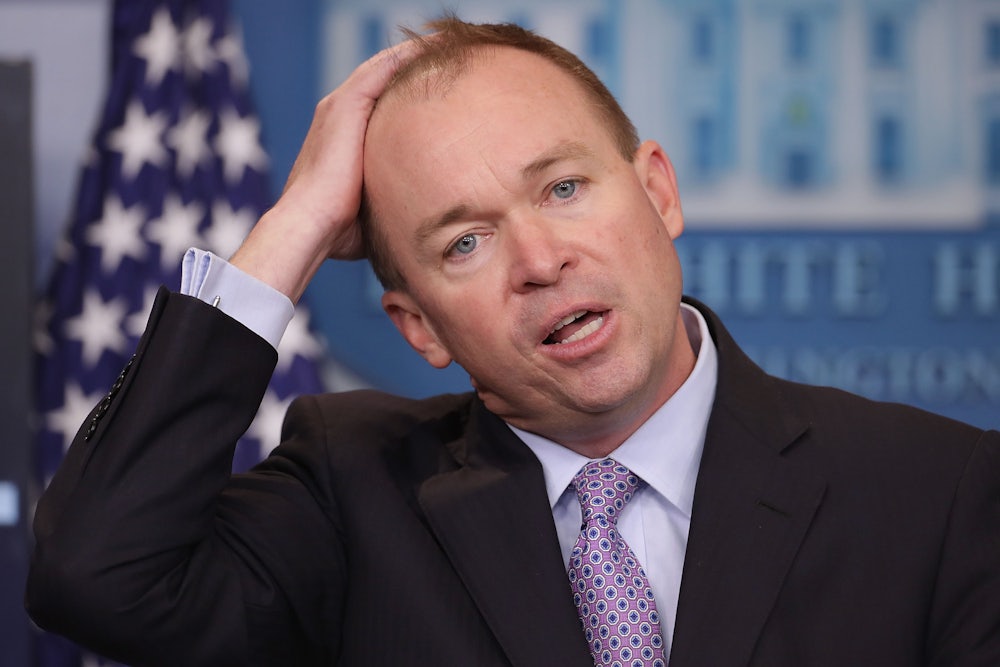The political durability of conservative economic doctrine owes a great deal to euphemisms. As the main exponents of that doctrine, Republicans seek to distribute income from the poor to the wealthy by gutting social programs and returning the savings to high-income earners through tax cuts. Euphemisms obscure the brutality of that underlying moral vision. The affluent, in the language of the right, are “job creators,” the poor are “dependents,” the central goal (reducing top marginal tax rates) is a “simplification,” the programs losing funding are being “reformed” or “saved,” and the purpose of this reordering, stripped of ideological valence, is “growth.”
This familiar jargon survived the wreckage of George W. Bush’s presidency, and remains bog standard Republican spin when tax cutting season rolls around. It is, to state the obvious, highly tendentious. But it is at least decodable.
It took a swindler of Donald Trump’s shamelessness, and the unexpected consolidation of power in Republican hands, to expose the limits of this spin. The breaking of Trump’s campaign promises, and the substitution of the old Republican agenda in the place of those promises, has forced Republicans to supplement spin with outright lies. Those lies were critical to the passage of the American Health Care Act, and to the advancement of other Republican priorities. This week—through the unveiling of Trump’s budget, and the coming Congressional Budget Office analysis of the AHCA—the lies are encountering reality for the first time.
Trump distinguished himself from his Republican primary rivals by repeatedly promising not to cut any of the three largest social spending programs: Medicare, Medicaid, and Social Security. Trump’s first presidential budget breaks that promise quietly with respect to Social Security (by proposing to cut the program’s disability benefit) and outlandishly with respect to Medicaid (which it would essentially halve).
Conservatives gloss over this betrayal by ignoring Medicaid and pretending the first two words of “Social Security Disability Insurance” don’t exist. But CNBC’s John Harwood pinned down Trump’s budget director, Mick Mulvaney, on the Medicaid question.
at briefing today, Mulvaney told me Trump promise not to touch Medicaid had been overridden by Trump promise to repeal/replace Obamacare https://t.co/WSafn6ighT
— John Harwood (@JohnJHarwood) May 23, 2017
Quaint supply-side spin can’t resolve this contradiction. When Mulvaney said one Trump promise would override another, what he meant was Trump made two incompatible promises and will honor the one that does more harm to the poor and sick. But Mulvaney was not simply covering for the fact that Trump lied. He layered a lie of his own on top of Trump’s.
It was clear during the campaign that Trump’s promise to repeal Obamacare and replace it with “something terrific” was in tension with his promise not to cut Medicaid, because the Affordable Care Act included an expansion of Medicaid that many states, including GOP-led ones, have adopted. If Trump and Republicans were proposing now to simply phase out that expansion, Mulvaney’s claim that one promise had “overridden” another would match the facts. But Trump’s proposed Medicaid cuts, which assume both the enactment of AHCA and further cuts to Medicaid, go hundreds of billions of dollars beyond phasing out Obamacare’s Medicaid expansion.
Even if Trump had not taken over the Republican Party, conservative shibboleths would be practically useless for the purposes of resolving the party’s contradictory promises to repeal the ACA without throwing millions off of their health insurance, and to leave people with pre-existing conditions vulnerable to discrimination by insurance companies. Republicans were only able to pass the AHCA in the House by deceiving themselves and their voters–in the face of widespread, cross-ideological criticism–about what the impact of the legislation would be. They cast votes on the bill, and then used it as the basis of Trump’s foundational governing blueprint, before the Congressional Budget Office could analyze its impacts on coverage and cost, and settle the dispute.
When that analysis finally lands on Wednesday, it will give form and scope to the lies Republicans told the public about what the bill would do—just as the CBO’s report on a previous, failed version of the AHCA did when it determined that the bill would cause 14 million people to lose their insurance immediately and leave 24 million uninsured over 10 years. Assuming Republicans continue to pursue their agenda as the evidence of their deceptions grows, the question will be whether reality asserts itself before they can enact the AHCA and other priorities, or they beat reality to the punch and deal with the consequences later when the truth catches up to people.
